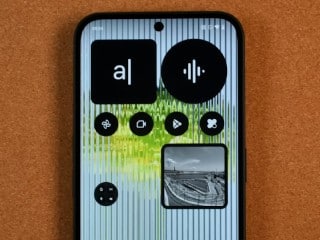- Home
- Wearables
- Wearables Reviews
- Oppo Watch Review
Oppo Watch Review
Oppo Watch is available in 46mm and 41mm dial sizes

Oppo Watch is the latest smartwatch to run WearOS and starts at Rs. 14,990
Is that an Apple Watch? That was the first thought that ran through my mind when I received the Oppo Watch. The design and the packaging definitely look inspired by the Apple Watch, but the similarities end there, as the Oppo Watch runs Google's Wear OS. With tech companies slowing down on smartwatches and only traditional watch manufacturers seemingly promoting Wear OS for a while now, it is good to see Oppo stepping in. Does the Oppo Watch make a strong case for Wear OS, or will this device go down as an Apple Watch replica? I test the watch to figure out that answer.
Oppo Watch design
The Oppo Watch can easily be confused for an Apple Watch, and a few people I met did assume it was the fruity device. Although the design looks inspired, Oppo has nailed it when it comes to fit and finish. The first thing that will grab your attention about the Oppo Watch is its AMOLED display. It is big, measuring 1.91 inches, and is curved on two sides. This not only looks good, but is also useful when swiping through the interface.
The gorgeous display flows into an aluminum case that feels premium to the touch. There are two buttons on the right, while the left has the speaker. The lower button has an accent and can be set to perform any function you choose. This also acts as the power button if you long-press it. The button at the top is used to open the app drawer and acts as the back key; long-pressing it summons the Google Assistant.
![]()
The Oppo Watch has two buttons on the right side along with the mic
You won't find lugs on the Oppo Watch as the straps attach directly to the aluminium body. It looks clean, but the downside is that the design is proprietary and finding replacements won't be easy. Oppo claims that the straps are made out of fluororubber, and they feel light. Over the course of two weeks using this watch, these straps never caused any irritation or rashes on my skin. You can separate the strap from the body by pressing tiny release buttons at the back. A firm press is enough to release the strap, but it wouldn't come off accidentally.
The back of the Oppo Watch has the heart-rate sensor in a dome in the centre, while the rest of the back is plastic. The sensor dome is made out of ceramic only for the 46mm Oppo Watch; the smaller 41mm Oppo Watch has a plastic dome. The charging pins are positioned towards the bottom and are slightly recessed. I did not notice any discolouration or corrosion on these pins during the review period.
![]()
The Oppo Watch uses proprietary connectors for the strap
Oppo has kept the device weight down, and the body alone weighs 40g. The fluororubber straps feel light as well and the watch size felt perfect on my wrist. You get a bigger 430mAh battery if you opt for the 46mm Oppo Watch, compared to 300mAh for the 41mm variant. The 46mm Oppo Watch is priced at Rs. 19,990 while the smaller 41mm Oppo Watch is priced at Rs. 14,990. You get a Watch VOOC Flash charger in the box. It is magnetic and holds the watch in place while charging.
Oppo Watch specifications and performance
Oppo has used the Qualcomm Snapdragon Wear 3100 processor to power this watch. There is a secondary low-power ambiq Micro Apollo 3 SoC that takes over when the watch is put in power saver mode. There is 1GB of RAM on the Oppo Watch, which makes a huge difference to the performance. I found the watch to be quick to respond to my inputs, and did not notice any lag while using it.
There is Bluetooth 4.2 to keep the watch connected to your smartphone, and 2.4GHz Wi-Fi so that it can work independently as well. There is no cellular data option. You get 8GB of internal storage as well. The 46mm Oppo Watch is water resistant upto 5ATM while the smaller 41mm variant is water resistant up to 3ATM. There is in-built GPS, GLONASS, and A-GPS. It also has support for NFC.
![]()
The crisp AMOLED display on the Oppo Watch is legible outdoors
The Oppo Watch runs Google's Wear OS and can be paired with an Android smartphone as well as an iPhone. I paired the watch to a Google Pixel 3 (Review) as well as an iPhone 11 (Review), but the experience was significantly better on the Android smartphone. Apple's tight grip on privacy and app control seriously cripples the paired Wear OS smartwatch. I wasn't able to reply to notifications when paired to the iPhone, pretty much limiting the Oppo Watches capabilities to that of a notifier. The experience was a lot smoother when paired with an Android phone , and I could reply to messages easily. Wear OS auto suggests basic replies but I could open up a small keyboard and swipe to type a message. I could also take calls quite easily on the watch, but I had to raise it next to my face to hear the caller. People I spoke to did not have any complaints about call quality.
The AMOLED display has punchy contrast and very good viewing angles. There is an ambient light sensor that sets the brightness automatically. I found the Oppo Watch to be a bit aggressive with keeping the brightness low to preserve battery life, and I had to manually bump the brightness up when I was outdoors. If you do this often or control the brightness manually, you will see an impact on battery life. The Oppo Watch responds to the raise-to-wake gesture very well, and the moment you move your hand back down the display goes off.
The Oppo Watch does a decent job of step and distance tracking. I counted 500 steps as I walked, and the watch counted 513 steps. If you set the watch to track you while walking outdoors, it latches onto a GPS signal very quickly. I walked around for 500m and the watch showed 0.51km which is within acceptable levels. If you are a casual user who wants a rough idea of the number of steps you take and distance you cover, the Oppo Watch will do that. For higher accuracy you should consider dedicated fitness trackers.
![]()
The Oppo Watch is capable of tracking heart rate and sleep quality
Heart rate tracking on the Oppo Watch was fairly accurate and it was in the same range as reported by the Mi Watch Revolve. The Oppo Watch was also quick to track changes in heart rate while exercising. Sleep tracking was accurate and the Oppo Watch did give me a breakdown of time spent in deep sleep, in light sleep, and awake. You can only see this breakup on the watch, but Oppo recommends downloading its HeyTap app to sync heart rate and sleep data. The HeyTap app also allows you to customise watch faces on the device.
With heart-rate tracking set to continuous, and handling a few notifications, the Oppo Watch lasted me for about a day and a half per charge. If you are planning to track workouts every day and answer a few calls on the watch as well, you can expect about one full day's worth of battery life. There is an always-on display option that can be enabled in the Wear OS app, but it will make battery life drop quicker. With my usage pattern, I found myself charging the watch in the morning (after wearing it overnight to track sleep) while having breakfast, and it slowly became a habit to drop the watch on the charger at that time.
You can enable the power saver mode to extend battery life, but that means the Oppo Watch offers limited functionality. Step tracking and heart rate tracking work, and of course it displays the time, but you can't log workouts, run any apps, or even see notifications. You will need to reboot or snap the watch into its charger to get out of power saver mode.
![]()
The Oppo Watch comes with a magnetic charging cradle, and charges quickly
Charging the Oppo Watch isn't much of an issue. It snaps onto the charging cradle easily. The watch got to 43 percent in 15 minutes, and 89 percent in 30 minutes. It took 42 minutes to charge completely.
Verdict
The Oppo Watch is very well designed and is a full-featured smartwatch running Google's Wear OS. In fact, it is one of the better Wear OS watches I've used recently, and the price is reasonable. I would recommend the 46mm Oppo Watch over the 41mm variant since the smaller battery could mean below-average battery life.
Sadly, Google hasn't done much with its Wear OS platform of late, and this watch's lack of innovative features could be down to the platform. If you are an Android user looking for a functional smartwatch, the Oppo Watch is definitely worth taking a look at.. However, if you are an iPhone user, the Oppo Watch wouldn't be ideal since Wear OS has multiple limitations. Instead, you can take a look at the Apple Watch Series 3.
Get your daily dose of tech news, reviews, and insights, in under 80 characters on Gadgets 360 Turbo. Connect with fellow tech lovers on our Forum. Follow us on X, Facebook, WhatsApp, Threads and Google News for instant updates. Catch all the action on our YouTube channel.
Related Stories
- Samsung Galaxy Unpacked 2026
- iPhone 17 Pro Max
- ChatGPT
- iOS 26
- Laptop Under 50000
- Smartwatch Under 10000
- Apple Vision Pro
- Oneplus 12
- OnePlus Nord CE 3 Lite 5G
- iPhone 13
- Xiaomi 14 Pro
- Oppo Find N3
- Tecno Spark Go (2023)
- Realme V30
- Best Phones Under 25000
- Samsung Galaxy S24 Series
- Cryptocurrency
- iQoo 12
- Samsung Galaxy S24 Ultra
- Giottus
- Samsung Galaxy Z Flip 5
- Apple 'Scary Fast'
- Housefull 5
- GoPro Hero 12 Black Review
- Invincible Season 2
- JioGlass
- HD Ready TV
- Latest Mobile Phones
- Compare Phones
- Tecno Pova Curve 2 5G
- Lava Yuva Star 3
- Honor X6d
- OPPO K14x 5G
- Samsung Galaxy F70e 5G
- iQOO 15 Ultra
- OPPO A6v 5G
- OPPO A6i+ 5G
- Asus Vivobook 16 (M1605NAQ)
- Asus Vivobook 15 (2026)
- Brave Ark 2-in-1
- Black Shark Gaming Tablet
- boAt Chrome Iris
- HMD Watch P1
- Haier H5E Series
- Acerpure Nitro Z Series 100-inch QLED TV
- Asus ROG Ally
- Nintendo Switch Lite
- Haier 1.6 Ton 5 Star Inverter Split AC (HSU19G-MZAID5BN-INV)
- Haier 1.6 Ton 5 Star Inverter Split AC (HSU19G-MZAIM5BN-INV)


















